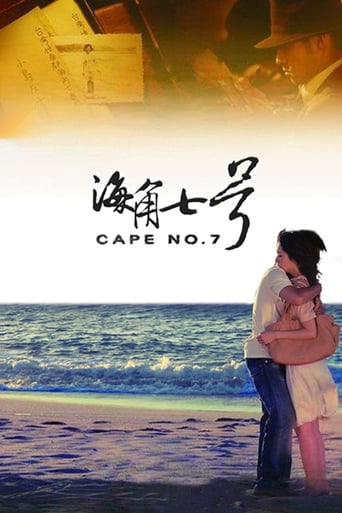

Cape No. 7 (2008)
Aga, a band singer, returns to Hengchun with frustration. Tomoko is a Japanese model assigned to organize a local warm-up band for the Japanese super star beach concert. Together with other five ordinary Hengchun residents who were not expected to be great or anything, they formed an impossible band.
Watch Trailer
Cast


Reviews
Why so much hype?
So much average
The film never slows down or bores, plunging from one harrowing sequence to the next.
While it doesn't offer any answers, it both thrills and makes you think.
I had a high expectation on this movie. Now I have seen it, I really think this movie is overrated. The Japanese girl Tomoko character is such a strange character. She is always yelling and her Chinese is very bad which is killing the movie. The over rapping with war time scene and current story line is not working at all.
For those viewers who are rusty on their Taiwanese history, Cape No. 7 is a good time, a sweet if somewhat angsty love story, and an intriguing glimpse into the day-to-day life of a Taiwanese town. For those who do know something of Taiwan's history and present international deadlock, the film becomes a vocal assertion of selfhood.The amorous tension in the film is between a local Taiwanese boy, Aga, and a Japanese model, Tomoko. Aga has returned home to his small seaside village moody and gruff after failing to make it as a musician in Taipei, while Tomoko, trying to organize a Japanese pop star's concert at a nearby resort, has been tasked with finding locals good enough to form the opening band. A sweet if somewhat skimmed-over subplot involves a failed romance set during the aftermath of Japan's occupation of Taiwan in World War II, in which a young Japanese teacher writes letters to his Taiwanese beloved as he sails home to Japan. Sixty years later, these letters now find their way into the hands of Aga and Tomoko, who determine to discover their owner.Both love stories reflect aspects of Taiwan's relationship with Japan at different times in its history. The Japanese teacher deserted his Taiwanese beloved, much as the Japanese deserted Taiwan after the war, turning over the reigns of their repressive but adept rule to the even more iron-fisted Chiang Kai-shek. During colonization, Japanese cultural systems were forcibly enforced on the island; under Chiang's rule, Chinese culture was dominant. In both cases, local Taiwanese culture was considered second-best. The movie addresses these issues of abandonment and desire for equality. Aga yearns for recognition of his talent, which he finally gets when Tomoko confesses her love and when his music – specifically a traditional Taiwanese ballad - is embraced both by the local villagers and, more importantly, by the Japanese pop star, who says he "knows the song." By winning the love of Tomoko and the acknowledgement of the Japanese pop star, Aga – and Taiwan – claim equal footing at last.The film can also be seen in light of Taiwan's current condition as a pariah in international relations. As a country formally recognized by only 23 states, most of them small islands in the Pacific, Taiwan has fought tooth and nail for just minimal acknowledgement from the world community. (This year's small victory as an observer in the World Health Assembly, which as part of the United Nations has traditionally refused to recognize Taiwan, is one such example.) Taiwan's lack of global recognition is due in a large part to the influence of China, which sees Taiwan as part of its territory. Tellingly, Cape No. 7 makes no mention of China or the Chinese influence on the island; most of the dialogue is in Taiwanese, Japanese, or Taiwan guoyu (Taiwanese Mandarin). Mandarin Chinese, the official language of China, becomes the compromise language between Tomoko and the Taiwanese villagers – she snaps at them, "I can't understand your Taiwanese accent!" and they make fun of her, saying, "Who can understand her Chinese?" Mandarin, although a necessary tool for communicating, is a foreign tongue for all of them, which illustrates the ambivalent position of China in the world of the film. In real life, ties between Taiwan and its Mainland neighbor have thawed rapidly; the two now permit direct flights, the first in sixty years, and economic relations grow closer with each dip of the stock market. China's marginalization in the film, however, consciously disregards that part of Taiwan's complicated present to explore other aspects of Taiwanese identity – perhaps a way of fighting back against the influence the PRC has increasingly tried to cast over the island.Aside from being a love story that will appeal to the emotion-laden teenager in all of us, Cape No. 7 is a glimpse into an unvarnished, unapologetic Taiwan. From pompous local politics, to millet wine and karaoke, to betel nuts and motorcycle mail delivery, the film throws back the shutters on all aspects of a Taiwanese village. Many of the actors in this production are not professionals, and it is the honest, tattered-at-the-edges quality of the scenes that most transports the audience into the world of the film.Cape No. 7 is the coming-of-age story of a nation. Shot on a shoestring and popularized by word of mouth, the film became one of the highest grossing ever to be shown in Taiwan, second only to Titanic. It is rare for Taiwanese films to receive much attention in the U.S., but as a confident self-introduction, Cape No. 7 has the potential to be the film that crosses the impasse. And now that Taiwan is coming into its own, hopefully this will be the first of many vibrant films to come out of this small but spirited country.
Analysis of this movies phenomenal popularity in Taiwan has cited cultural, historical, social and political reasons. To the general audience outside Taiwan, this movie's appeal comes from its affecting story of a group musical oddball underdog, a proliferation of likable characters (from pop superstar to humble "little people") and a duo of parallel love stories (which reminds me, strangely of "Possession" (2002), an unlikely yet plausible comparison).I'll start from the end. While people may have different view on whether "Cape no. 7" is sufficiently engaging throughout its entire 129 minutes of running time, the vote seems unanimous that the last 15 minutes is a climatic finale well worth waiting for. By that time, the audience would have developed a firm empathy with some (or likely all) of the members of the local (a quaint little resort town by the ocean in the south of Taiwan) band assembled in a most haphazard fashion to do the warm-up for a visiting Japanese pop super star. With a recruiting process that reminds you of "The magnificent seven" and training process that reminds you of "Dirty dozen", the final rock band that is supposed to showcase local talent comprises all kinds of odd ball characters imaginable (and, indeed, unimaginable) - from a preteen little girl as cool as cucumber at key board and an 80-year-old man who, deficient in his attempt to learn the bass guitar, sneaks up with his tradition Chinese instrument the full-moon (referring to the shape) lute that blends surprisingly well with the pop group. What the climatic finale reminds me of is another concert scene at the end of a Japanese movie called Yomigaeri (or Resurrection).The lead of the band is a talented pop musician Aga who, failing to get his break, gives up on music and works as a postman. The audience however knows where his heart is, seeing his fingering the string that ties a parcel as if it were a guitar string. The love story is of course his, and one that takes a format that always works a relationship that starts as a fight. The girl is a Japanese wannabe model who, ending up being an organizer-cum-PR-person for the concert, gets stuck in this forsaking place. Two unhappy people throw in a situation with endless potential for conflict generates ample comic scene that eventually leads to romance. Parallel to this is a love story told through letters written by an old man who recently died in Japan and now sent by his daughter to an unknown address which Aga has to deliver too.I started by mentioning three things that will appeal to the general audience. In addition to the music and the love story, there are so many characters in this movie that it will take a few pages to describe them all. Many of them have their own stories, and even those of whom we know very little generate interests in their own various ways. And there is no villain in this movie.This is huge crowd pleaser that has something for almost everybody. To me, it's the rapport between the members of the band and their final coming together to make exhilarating music.
By the time I watched this film, it has broken Taiwan's all time box-office record. Taiwan has no Hollywood, but for decades until recent years, it has produced dozens of movies every year. It's been the hub of Chinese-speaking film making industry and nurtured internationally renowned directors such as Hsiao-hsien Hou, Edward Yang and, of course, Ang Lee. That's why it's a surprise to see what the film has achieved because, whichever way you look at it, it fell short of many high standards set by its predecessors. It's by no means a bad movie though. A warm story executed reasonably well. The elements of romance and certainly music (Taiwan's pop music industry is also well developed) added to its viewing pleasure. Beautiful photography gives extra charms to the tropical town in the southern tip of the island. Acting wise not overall brilliant, but some roles depicting typical local characteristics are particularly lovable. Old Mao is the best example.Perhaps the underlying reason for the film's popularity is something beyond its plot. Taiwan society, in recent years, has suffered from slow economy, isolation from the world as a result of "One China Policy", and especially the conflict between political parties within the island. People are tired. Tired of struggling to make a living in the big cities and tired of watching confrontations among politics everyday and night on TV. The simple small town lifestyle and good-willed characters demonstrated in the film remind people of the good old days. For two hours, it's like providing an escape for people who have long been trapped or bringing light to people who have long been live in dark. This film will represent Taiwan for the quest of Oscar's best foreign language film. It's not going to win. It's even unlikely to be nominated. But, maybe by accident, this film has achieved something that makes it bigger than winning prizes -- bringing hope to depressed souls!




